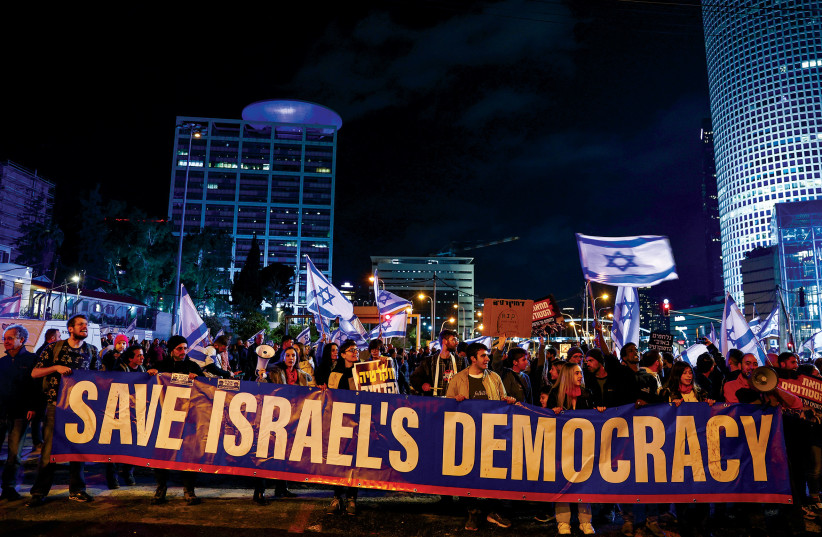Wars have grave costs that are very visible: many people lose their lives; others lose body parts; and some lose their homes. But there are additional costs that may be less obvious.
One such cost is a weakening of the public’s commitment to democratic values.
The sense of fear fueled by the war, facing threats, and the need to close ranks against the enemy – all these may create the impression that liberties and democratic values must be sacrificed for victory and security. If indeed the public succumbs to the temptation to erode democracy for the sake of victory, the democratic system will be in severe danger.
So, what has the war in Gaza done to the democratic attitudes of Israelis? The Institute for Liberty and Responsibility at Reichman University has been regularly monitoring the political and value-based attitudes of the Israeli public.
We conducted a comprehensive survey on this topic in July, around two months before the outbreak of the war, and another one at the end of November, during the eighth week of the war.
How the war has changed the Israeli public
Each of these surveys, carried out by the online survey company iPanel, covered a representative sample of around 1,500 respondents. Comparing these surveys provides a crystal-clear picture of the “before” and “after” and accurately shows how the war has affected the democratic views of the public. To put it succinctly, it has affected them badly.

Democracy could be undermined when the public flocks to a leader who seeks to gain power and weaken the other mechanisms and institutions of governance. To identify the willingness of the public to support a leader with autocratic tendencies, we asked people whether it is preferable to vote for leaders who propose efficient solutions, even if those solutions are not quite in line with democratic principles.
According to our pre-war survey, 26% of the public agreed that it is preferable to vote for a leader who is efficient but undemocratic. The survey conducted in November, during the war, shows that the share of those who think so has risen to 35%. A similar question examined the level of support for a strong leader who disregards the Knesset and the elections.
The rate of support for such a leader increased from 27% before the war to 34% in its midst. In other words, in order to solve the nation’s problems, around a third of Israeli citizens are currently in favor of a leader who might deviate from democratic principles.
In times of war, there is increased pressure to speak in unison and to silence any dissent, in contradiction of the basic democratic right to free speech. Indeed, our findings indicate a significant decline in the public’s commitment to freedom of speech. Prior to the war, 67% of the public believed that free expression should be ensured even for those who criticize the State of Israel; in November, the share of those who hold this belief declined to 54%.
Concurrently, there is growing opposition to the activity of civil society organizations. In July, 32% of Israelis agreed that the activity of organizations that criticize the state should be banned. By November, 41% of respondents agreed with this viewpoint. In other words, nearly half of the citizens do not think critical statements against the state are covered by freedom of speech.
The anti-democratic impact of the war is also evident in the attitudes of the Jewish public toward the Arab public. We observed a sharp drop in support among Jews for increased efforts to provide equal rights to Israel’s Arab citizens, from 56% before the war down to 41% in November.
At the same time, there has been a considerable increase in the share of Jewish citizens who support revoking the right to vote from individuals who refuse to acknowledge Israel as the nation-state of the Jewish people. The support rate for this measure has increased from 45% to a majority of 61%. All this suggests that the war has harmed public support for equality between Jews and Arabs and strengthened nationalistic tendencies among the Jewish public.
ONE CAVEAT must be made: our data show the immediate anti-democratic effect of the war on the public’s views. This effect may prove to be short-lived and transient; once the war ends and the sense of emergency diminishes, people may return to their previous positions.
However, the impact of the war may turn out to be enduring. The harsh, traumatic experience Israelis are going through these days may stay with us for a long time and shape our political and value-based views for years to come.
Democracy cannot exist without a multitude of people who are committed to it and willing to fight to protect it.
Today, well over two months after the outbreak of the war, we are witnessing a dwindling of the democratic commitment of the Israeli public. If this commitment does not regain its strength after the war, there will be a significant political cost in addition to the terrible human cost.
The writer is an associate professor at the Lauder School of Government, Diplomacy and Strategy at Reichman University, and substitute head of the Institute for Liberty and Responsibility.
